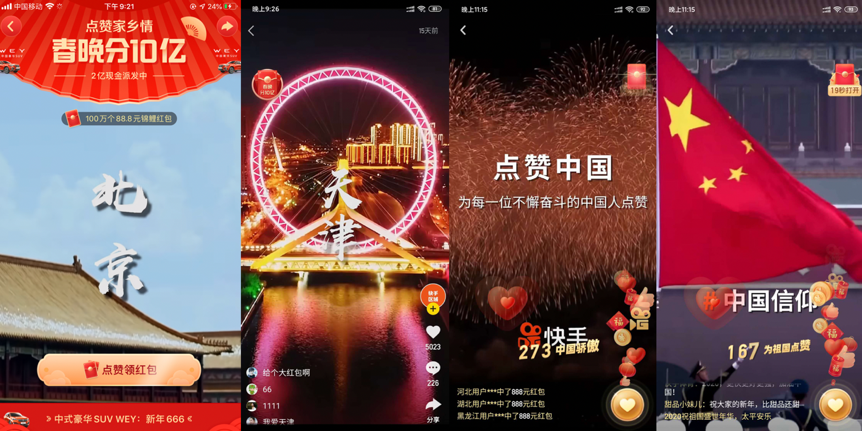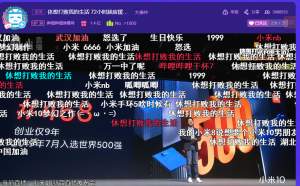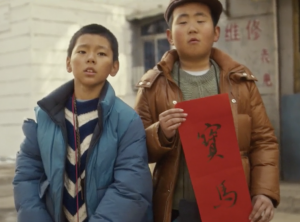
Several moments captured on Kuaishou’s short-video app during the CCTV Spring Festival Gala
China’s CCTV Spring Festival Gala again broke viewership records this year, perhaps partly as a result of the the coronavirus outbreak that is keeping more people at home. And while CCTV’s show, broadcast live on the eve of the Lunar New Year, tends to garner the bulk of attention, it offers limited opportunities for brand integration since it has historically reserved sponsorships for select deep-pocketed domestic tech firms.
However, there are many other programs in a similar vein produced by regional broadcasters that air in the days before and after CCTV’s show, and these can provide brands with additional chances to gain exposure on a regional and nationwide basis via satellite and streaming. Most run without commercial breaks, creating an imperative for brands to find creative ways to leverage sponsorships for more direct integration with the content of the gala shows.
In terms of content, there were two main areas of emphasis this year. One was “popularity,” using young idols with large fan bases and drawing on entertainment IP and viral memes to generate buzz. The other was “quality,” highlighting mainstream performers and promoting “positive energy” through more traditional elements of gala shows such as sketch comedy, opera and nostalgic content that will resonate with older viewers. The boundary between the two can be subtle, and some networks tried to combine both in order to appeal to as wide an audience as possible.
For the most part, China’s major video-streaming platforms do not engage in the production of original gala shows for the Spring Festival, instead partnering with the major networks to stream their content. The one exception is Bilibili, which catered to its core audience of young ACG (anime, comic and games) fans with a special gala show that can effectively compete with CCTV’s broadcast. And as short video has surged in popularity, Douyin and Kuaishou — the two apps that lead the Chinese market — duked it out this year with competing sponsorship strategies that involved distributing massive amounts of money to viewers via virtual “red packets.” Kuaishou sponsored CCTV’s big show, but Douyin managed to place itself on many of the regional gala shows (as either title sponsor or as red envelope partner) as part of its effort to give away RMB 2 billion ($288 million) over the course of several weeks.
Below, we take a look at this year’s crop of Spring Festival shows and how these brands and others were featured on them. While CCTV dominated the airwaves on January 24, China’s “big five” satellite networks competed the following day, with most of the smaller reigional broadcasters airing their shows on January 23.
CCTV
Content: The state broadcaster’s show generally hews to national traditions, though this year it included several performances targeting younger audiences, including “New Year Disco,” a take on the viral hit “Wolf Disco,” “Hello 2020,” performed by several youth idols, and a comedy skit with Xiao Zhan, another of the past year’s hottest young celebrities.
Sponsors: Short-video platform Kuaishou beat out several other tech giants to land the interactive sponsorship of the CCTV gala, giving away RMB 1 billion ($144 million) to viewers during the broadcast as they interacted with Kuaishou’s app, watching and liking videos to get cash. Kuaishou reported that more than 2.2 million viewers nabbed red envelopes worth anywhere from RMB 66.6 to 2020.
Taobao also found a way in as CCTV’s exclusive e-commerce sponsor, which incorporated Alibaba’s mobile payment platform Alipay and flash sales platform Juhuasuan.
Hunan TV
Content: Hunan TV stood out by producing two Spring Festival galas, the first on January 18, well before any other broadcasters, and the other a week later on January 25, the first day of the Lunar New Year. Each offered opportunities for different brands to participate as sponsors.
Hunan TV split its content strategies. The first show focused on popularity and entertainment, with Li Yuchun, Wang Yibo, Cai Xukun, and Kris Wu among the top names, while the January 25 extravaganza targeted overseas Chinese viewers with more mainstream performers such as opera singer Li Shengsu.
Sponsors: Douyin took the lead on the January 18 show, with its logo (the same as TikTok’s) featured prominently onstage and on screen via graphic effects. Douyin was also mentioned by name during the show to promote its virtual red envelope giveaways.
The January 25 program’s title sponsor was e-commerce app Pinduoduo, which also conducted a red envelope campaign tied to the show. Hunan TV allowed ads to air during the broadcast, and these featured global brands including Estee Lauder, Nissan and Coca-Cola.
Dragon TV
Content: Like most major satellite networks, Dragon TV opted to air its show on January 25, and its offering combined popular and nostalgic content. Comedy was a highlight, in particular a segment featuring e-commerce livestreaming star Li Jiaqi and comedian Song Xiaobao. Dragon TV’s broadcast received the most acclaim and highest rating of the shows that aired on that date.
Sponsors: Douyin served as the title sponsor and further promoted its red envelope campaign. The app was featured on-screen as well with hosts and performers seen interacting on Douyin during the broadcast.
Beijing TV
Content: The capital’s network focused on nostalgia-inspiring content for its January 25 show, inviting cast members from few classic TV shows and artists that audiences may not have seen in years. It also included more recently popular performers such as Xiao Zhan and Rocket Girls 101.
Sponsors: Baidu’s Duxiaoman Finance app, which was the red envelope sponsor of the CCTV gala in 2019, served the title sponsor, while FlashEx delivery and Mengniu dairy served as supporting sponsors.
Jiangsu TV
Content: Also airing on January 25, the provincial network sought out stars that could appeal to all generations, from singer Henry Huo to the stars of last summer’s hit Tencent Video drama “The Untamed” among the major draws.
Sponsors: Gu Jing Gong Liquor was the title sponsor, and its products were placed on the show and offered in giveaways to viewers. Among the other brands involved in the gala were Junlebao Dairy, JDB Tea, Betis olive oil, and Douyin as red envelope partner.
Zhejiang TV
Content: Despite bringing together beloved performers and popular celebrities together for its January 25 broadcast, Zhejiang TV still faced a formidable PR obstacle in the aftermath of actor Godfrey Gao’s death in November while filming a sports adventure show for the network, which drew scrutiny of Zhejiang TV’s history of unsafe practices. Viewers
Sponsors: Douyin took the title sponsorship, promoting its giveaway and integrated its product by bringing one of its top creators onstage to dance.
Liaoning TV
Content: The northeast provincial broadcaster led the ratings for the January 23 gala shows with high quality content, including Henry Huo and the sketch comedy of Song Xiaobao.
Sponsors: Douyin secured the title sponsorship, while Weile games served a supporting role. Youku was the exclusive streaming partner for the show.
Shandong TV
Content: Like many of the smaller regional networks, Shandong TV aired its show on the “eve” of Lunar New Year’s eve. Li Yuchun, Huang Bo and Huang Zitao were among the popular young celebrities on hand to perform.
Sponsors: Various local brands participated, led by Luhua cooking oil as title sponsor. Alibbaba’s Juhuasuan was the red envelope sponsor, offering an interactive game and QR codes during the show to let viewers collect money.
Jiangxi TV
Content: Popular acts were the focus of the eastern network’s January 23 show, though Henry Huo also made an appearance.
Sponsors: Poyang Lake Rice was the title sponsor, while Douyin also participated.
Tianjin TV
Content: The northern city’s broadcaster also hosted two shows, one on January 23, and another on the otherwise “empty” day of January 26. The first gala featured comedians who performing “crosstalk” (相声, xiangsheng), a genre that is closely associated with Tianjin. The January 26 show had a “homecoming” theme, with four traditional performers who hail from the city.
Sponsors: Junlebao dairy was the title sponsor, and Jing Liquor was featured as a special product. Sina Weibo was an interactive partner, and Douyin promoted its red envelope campaign during the broadcasts.





